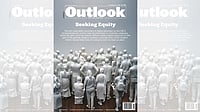Pakistan's interim Information Minister, Murtaza Solangi, addressed concerns about the situation in Gilgit-Baltistan, emphasizing its peaceful nature. This comes amid reports of sectarian tensions in the region, prompting the suspension of mobile internet services.
In a statement shared on platform X, Minister Solangi refuted speculations of Pakistan Army deployment, deeming them baseless. He highlighted that daily life in Gilgit-Baltistan continued undisturbed, with open roads, active trade centers, bustling business activities, and functioning educational institutions. Notably, the region has a history of sectarian rivalry between Sunni and Shia Muslims.
The Minister clarified that the presence of Pakistan Army and civil armed forces was solely to maintain law and order, particularly in anticipation of the chehlum or Arbaeen, a significant religious event marking the 40th day of mourning following the seventh-century tragedy in Karbala, Iraq.
Elaborating on security measures, Solangi mentioned efforts to protect procession routes and Imambargahs, as well as the imposition of section 144 across the region to safeguard lives and prevent untoward incidents. He dismissed reports of unrest as unfounded, acknowledging that peaceful protests sometimes occur in response to religious and sectarian concerns.
Tensions escalated in the region following protests in Gilgit and surrounding areas, sparked by alleged derogatory remarks from a prominent Sunni cleric during a demonstration. Protests have continued for over a week, with derogatory statements from both sides exacerbating the situation.
Mobile internet services have been suspended throughout the region, and legal actions have been taken against individuals involved in inciting sectarian tensions on social media.
In international developments, the United Kingdom has joined Canada and the United States in advising its citizens to avoid visiting the northern areas of Gilgit-Baltistan. The U.S. embassy issued a cautionary statement due to recent protests in Skardu and Diamer, highlighting potential demonstrations, road closures, and disruptions to local mobile and internet networks.


























